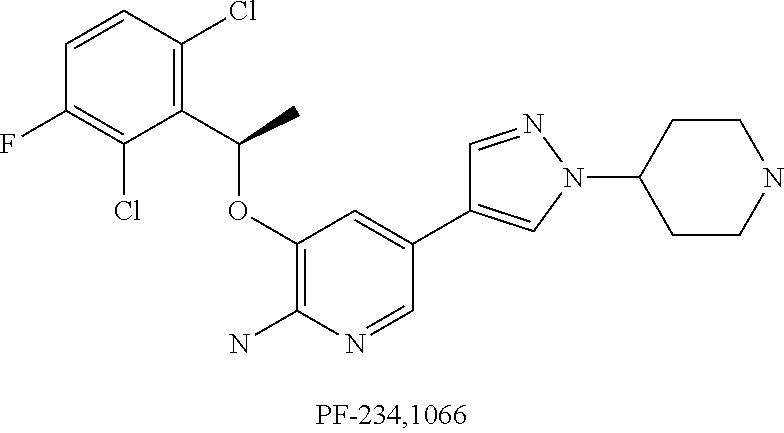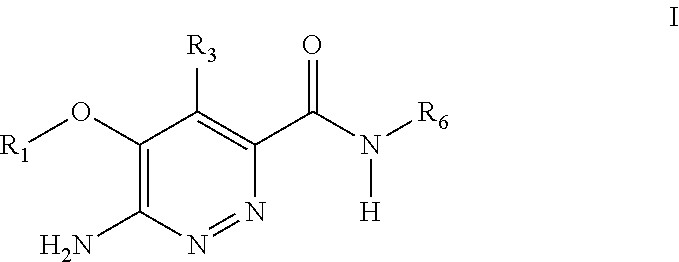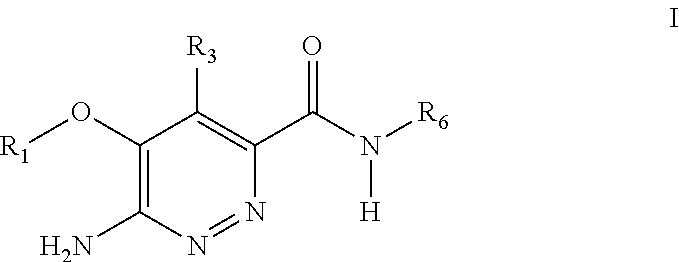Substituted pyridazine carboxamide compounds as kinase inhibitor compounds
a technology of pyridazine and carboxamide, which is applied in the field of substituted pyridazine derivatives, can solve the problems of poor prognosis and disease outcome, overexpression of c-met or hgf, and achieve the effect of treating or lessening the severity of protein kinase modulated diseases
- Summary
- Abstract
- Description
- Claims
- Application Information
AI Technical Summary
Benefits of technology
Problems solved by technology
Method used
Image
Examples
example 1
{6-amino-5-[(2,6-dichloro-3-fluorophenyl)ethoxy]pyridazin-3-yl}-6-morpholin-4-yl-pyridin-3-yl carboxamide (1)
[0169]
Step 1: A mixture of 1a (5.0 g, 29.3 mmol), morpholine (12.8 g, 146.6 mmol) and TEA (10 mL) in DCM (30 mL) was stirred at room temperature for overnight. The reaction mixture was diluted with water (30 mL) and two layers were separated. The aqueous layer was extracted with DCM (30 mL×2). The combined organic layer was collected, washed with brine, dried over Na2SO4, filtered and concentrated to give 1b (6.38 g, 98%) as a yellow solid.
Step 2: The mixture of 1b (300 mg, 1.36 mmol) and Pd / C (10%, 300 mg) in methanol was hydrogenated at atmosphere at r.t. for 2.5 h, filtered and concentrated to give 1c (258 mg, 100%).
Step 3: To a solution of A (200 mg, 0.37 mmol) in DMF (10 mL) was added HATU (209 mg, 0.55 mmol), followed by DIEA (95 mg, 0.73 mmol). The resulting mixture was stirred at r.t. for 30 min, 1c (105 mg, 0.55 mmol) was added. After being stirred at r.t. for 1.5 h,...
example 2
{6-amino-5-[(2,6-dichloro-3-fluorophenyl)ethoxy]pyridazin-3-yl}-N-pyrazol-4-ylcarboxamide 2
[0170]
Step 1: 2a (5.0 g, 73.5 mmol) was added in portions to H2SO4 (35 mL) while keeping the temperature below 40° C., then 70% HNO3 (5.06 mL, 80.6 mmol) was added dropwise while maintaining the temperature below 55° C. The mixture was then heated at 55° C. for 5 h and cooled to 0° C. The mixture was neutralized with 50% NaOH and the resulting slurry was diluted with ethyl acetate. The resulting precipitate was removed by filtration. The filtrate was separated and the organic phase was washed with water and brine, dried over MgSO4 and concentrated in vacuum. The residue was crystallized for ethanol to afford 2b (7.1 g, 85.5%)
Step 2: The procedure from 2b to 2 was similar to that of 1b to 1, to provide 2 (6.9 mg, the yield from A to 2 is 2.6%). 1H-NMR (300 MHz, CD3OD): δ=7.87 (d, 2H), 7.45-7.50 (m, 1H), 7.27 (t, 1H), 7.17 (s, 1H), 6.25-6.32 (m, 1H), 1.88 (d, 3H). LC-MS [M+H]+: 411.0.
example 3
{6-amino-5-[(2,6-dichloro-3-fluorophenyl)ethoxy]pyridazin-3-yl}-N-(1-methylpyrazol-4-yl)carboxamide 3
[0171]
Step 1: Dimethyl sulphate (3.33 g, 26.4 mmol) was slowly added to a stirred solution of 2b (1.0 g, 8.85 mmol) in 1N NaOH (10 mL) that had been warmed to 30° C. After being stirred at r.t. for 3.5 h, the reaction mixture was extracted with ethyl acetate (10 mL×4), combined the organic phase, washed with brine (20 mL), dried over MgSO4, filtered and concentrated. The residue was triturated with petrol and filtered to give 3a (0.98 g, 87%) as a white solid.
Step 2: The procedure from 3a to 3 was similar to that of 1b to 1 to provide obtained 3 (133 mg, the yield from A to 3 is 42.7%). 1H-NMR (300 MHz, DMSO-d6): δ=10.76 (s, 1H), 8.02 (s, 1H), 7.64 (s, 1H), 7.56-7.61 (m, 1H), 7.47 (t, 1H), 7.01 (s, 1H), 6.82 (s, 2H), 6.15-6.22 (m, 1H), 3.78 (s, 3H), 1.81 (d, 3H). LC-MS [M+H]+: 424.9.
PUM
| Property | Measurement | Unit |
|---|---|---|
| temperature | aaaaa | aaaaa |
| temperature | aaaaa | aaaaa |
| temperature | aaaaa | aaaaa |
Abstract
Description
Claims
Application Information
 Login to View More
Login to View More - R&D
- Intellectual Property
- Life Sciences
- Materials
- Tech Scout
- Unparalleled Data Quality
- Higher Quality Content
- 60% Fewer Hallucinations
Browse by: Latest US Patents, China's latest patents, Technical Efficacy Thesaurus, Application Domain, Technology Topic, Popular Technical Reports.
© 2025 PatSnap. All rights reserved.Legal|Privacy policy|Modern Slavery Act Transparency Statement|Sitemap|About US| Contact US: help@patsnap.com



